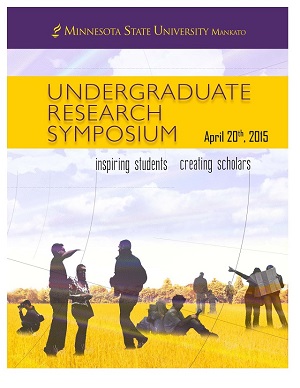Narrative Skills of School-Age Children with Learning Disabilities
Location
CSU Ballroom
Start Date
20-4-2015 2:00 PM
End Date
20-4-2015 3:30 PM
Student's Major
Speech, Hearing, and Rehabilitation Services
Student's College
Allied Health and Nursing
Mentor's Name
Megan Mahowald
Mentor's Email Address
megan.mahowald@mnsu.edu
Mentor's Department
Speech, Hearing, and Rehabilitation Services
Mentor's College
Allied Health and Nursing
Description
Children with learning disabilities often have difficulties with the understanding and use of oral language. Specifically, they may produce incomplete narratives (referring to the ability to tell a story). The ability to tell a complex narrative is positively correlated to reading comprehension abilities and therefore is important to explore with children with disabilities. Narrative samples were collected from 20 3rd grade students, 10 typically developing and 10 students with disabilities. Students also completed a standardized oral language assessment and reading achievement scores were collected. These data were analyzed to determine if a correlation exists between these narrative performances and their standardized language assessment scores. Preliminary findings suggest that when comparing both the narrative evaluations and standardized language assessment scores of typically developing 3rd grade students to those with learning disabilities, the students with learning disabilities typically produced lower scores. Understanding and recognizing this correlation between narrative skills and standardized language assessment scores could aid speech-language pathologists and school practitioners in implementing the necessary and appropriate techniques that will allow for their students to achieve success in the classroom.
Narrative Skills of School-Age Children with Learning Disabilities
CSU Ballroom
Children with learning disabilities often have difficulties with the understanding and use of oral language. Specifically, they may produce incomplete narratives (referring to the ability to tell a story). The ability to tell a complex narrative is positively correlated to reading comprehension abilities and therefore is important to explore with children with disabilities. Narrative samples were collected from 20 3rd grade students, 10 typically developing and 10 students with disabilities. Students also completed a standardized oral language assessment and reading achievement scores were collected. These data were analyzed to determine if a correlation exists between these narrative performances and their standardized language assessment scores. Preliminary findings suggest that when comparing both the narrative evaluations and standardized language assessment scores of typically developing 3rd grade students to those with learning disabilities, the students with learning disabilities typically produced lower scores. Understanding and recognizing this correlation between narrative skills and standardized language assessment scores could aid speech-language pathologists and school practitioners in implementing the necessary and appropriate techniques that will allow for their students to achieve success in the classroom.
Recommended Citation
Doran, Haley. "Narrative Skills of School-Age Children with Learning Disabilities." Undergraduate Research Symposium, Mankato, MN, April 20, 2015.
https://cornerstone.lib.mnsu.edu/urs/2015/poster_session_B/1




